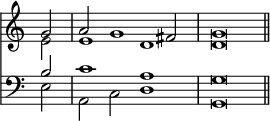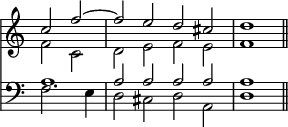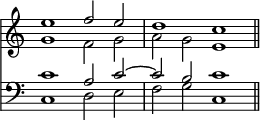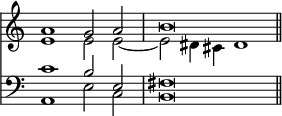A Dictionary of Music and Musicians/Medial Cadence
MEDIAL CADENCE (Clausula in medio modi). I. Among the numerous Cadences formed upon the Regular and Conceded Modulations of the Ecclesiastical Modes, that proper to the Mediant holds a place inferior in importance only to those occupied by the Final and Dominant.
In Plain Chaunt Melodies, the Medial Cadence sometimes leads to a close so satisfactory that it almost sounds final; as in the First Ending of the First Tone—

In Polyphonic Music, it is susceptible of infinite variety of treatment, as may be seen from the following examples—
| Mode I. | Kircher. |
 | |
| Mode II. | |
 | |
| Mode III. | |
 | |
| Mode IV. | Vittoria. |
 | |
| Mode V. | Cæsare de Zachariis. |
 | |
| Mode VI. | Orlando di Lasso. |
 | |
| Mode VII. | Palestrina. |
 | |
| Mode VIII. | Palestrina. |
 | |
| Mode IX. | Kircher. |
 | |
| Mode X. | |
 | |
| Mode XIII. | Giovanni Croce. |
 | |
| Mode XIV. | Palestrina |
 | |
In the selection of these examples, we have confined ourselves exclusively to True Cadences, for the sake of illustrating our subject with the greater clearness: but, the Old Masters constantly employed Cadences of other kinds, in this part of the Mode, for the purpose of avoiding the monotony consequent upon the too frequent repetition of similar forms. It is only by careful study of the best works of the best period, that the invigorating effect of this expedient can be fully appreciated. [See Mediant; Modes, the Ecclesiastical; Modulations; Clausula Vera, Appendix.]
II. This term is also applied, by Dr. Callcott, and some other writers on Modern Music, to closes in which the Leading Chord is represented by an Inverted instead of a Fundamental Harmony.

[ W. S. R. ]
